
BPF re-modeled a social audit tool for federations to monitor progress on the sustainable development goals of education and gender equity in Assam, and fill gaps based on feedback from the federation women of Assam Mahila Samata Society and the Jan Kalyan Khanda Mahasangh.
Assam Mahila Samata Society, BPF and Jan Kalyan Khanda Mahasangh together re-worked the Data Exhibition to monitor sustainable development goals (SDGs), an innovative social audit tool for federations to monitor entitlements. The tools were deployed by women’s collectives themselves to monitor progress on the sustainable development goals of Education (SDG 4) and gender equity (SDG 5) in their local context. The data exhibition helped to spread awareness amongst the community members on the existing schemes and its benefits. It also alerted the government officials about the discrepancies in the data illustrating reach of the programmes and entitlements. The issues highlighted in the exhibition included quality education, incidence of child labour, child marriage, violations against women, wage discrimination, and access to public entitlements.
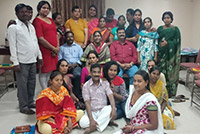
The focus of the project is on supporting collectives working with sex workers and LGBTIQ communities in rural areas at the intersections of gender and caste, towards greater voice and participation in local decision-making.
Some new areas of intervention in the project is helping people understand issues around mental health and also increase and deepen digital literacy among these populations in small town/rural Telangana, Andhra Pradesh and Karnataka. Both these needs emerged from the community and this was a response to this. The objective for the intervention on mental health is to create peer counselors who are alert to issues of mental distress including preventing suicide. The objective of the digital literacy initiative is to improve people’s ability to use the range of mobile services available but also ensure that they stay safe.
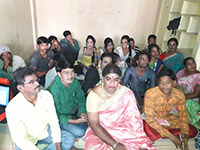
For this project, BPF conducted four modules in three days of training for the LGBT community to help them develop both leadership qualities and a vision.
Members of the LGBT community were oriented on the history of LGBTQI in India including in mythology etc. Through the training, they understood basics of the structure of government and local self-governance. They were introduced to the ideas of the importance of voting and with a basic idea of the constitution and its value as Indian citizens. The evaluation of the respective participants before and after the training pointed to an expansion of their vision into a more broad-based understanding of governance issues.
The programme gives financial, emotional, social and intellectual support to a small group of changemakers and gives them the freedom to pursue their ideas and vision so as to bring new voices into the movement and change the agendas that the movements are pursuing.
People from sexual minority communities have expressed a desire to grow beyond the confines of the HIV prevention and treatment service delivery paradigm. There are a number of leaders who are committed, inspired and have not had a chance to develop the ideas and approaches. There is growing dissatisfaction and frustration among grassroots activists as most of the interventions that are focused on HIV service provision are failing to deliver due to being denied their basic social entitlements. The project is supporting two women from the sex trade, to work on the welfare of other sex workers and also document their stories of struggle and perseverance.
To map best practices and challenges in terms of the policies which are being rolled out in various states
There has been huge advance made in country at the policy level on transgender issues often there are gaps in implementation. There are also efforts to ensure that the benefits are reaching the community members. Through a study in different states in partnership with CBOs located in the different states we are documenting these issues and practices in order to help government officials and other better implement the projects.
A critical examination (using secondary Literature) of the Supreme Court Judgement of April 15, 2014; the Expert Committee Report of the Ministry of Social Justice and Empowerment, and the Rajya Sabha Bill (Transgender Persons and the Rights of Transgender Person Act, 2014 was carried out along with a review of the transgender policies, schemes, etc. of five state governments.
The study focused on the main policy/legal developments at the national level and in five chosen states. While transgender people are among the most marginalised communities in India, who face violence, abuse and discrimination, there has been an opening of policy space over the past five years vis-à-vis transgender issues. Various factors have contributed to this shift- including the work of leaders, community members and other sympathisers including a more sensitised judiciary, and shifts in medical portrayal, among other things. The research method and tools were developed in consultation with community members and experts to finalise the survey instruments, IDI guides, and the identification of potential organisations to partner with.
The South-To-South HIV/AIDS Resource Exchange (SHARE) project commissioned BPF to document 20 practices covering a broad spectrum of India’s best HIV/AIDS prevention interventions.
This knowledge management product, meant for dissemination in Asia and Africa, capture key strategies that have proven to be effective, lessons learnt and roles and responsibilities of key stakeholders, government and other players in India. BPF collected and analysed primary and secondary data, interviewed doctors, experts and consultants, and wrote up each of the 20 different practices. After technical appraisals by the Government of India’s NACO advisors, feedback was incorporated, and the final approved document was designed and laid out.
Voluntary Health Services (VHS) who appointed BPF to document three best practices for the National Aids Control Organization (NACO), Ministry of Health and Family Welfare, Government of India, on HIV prevention, care and treatment over a three-month period.
The South-to-South HIV/AIDS Resource Exchange (SHARE) project has been developed with a vision of exchanging experiences, expertise and best practices between countries in Africa and the Indian subcontinent. It is supported by the United States Agency for International Development and administered by the Voluntary Health Services (VHS). These practices will be shared with other governments interested in replicating these practices.
BPF’s baseline study conducted in July 2015 documents women’s anti-corruption initiatives in eight organisations in seven countries. BPF also submitted two separate detailed reports on DAMPA, Philippines and PDAP, Bangladesh in October 2015.
The Transparency and Accountability Initiative (T&AI), supported by UNDP GAIN and facilitated by the Huairou Commission, provides a platform for grassroots women to act as agents of change in achieving good governance. The baseline report submitted in July 2015, documents women’s anti- corruption initiatives in eight organizations in seven countries.
BPF helped assess the impact of for Huairou Commission’s (HC) Transparency and Accountability Initiative by designing the baseline for 6 organisations.
Baseline data for 6 different organizations across the world was collected between November and January 2014. Qualitative data was captured in focus group discussions with the grassroots women, along with Individual Interviews. Quantitative and qualitative baseline data for Huairou Commission’s (HC) Transparency and Accountability Initiative was analysed during February and March 2015. In the next six months, the women’s organizations will assess the impact of their corruption initiatives and this data will be presented in the end of project report in December 2015.
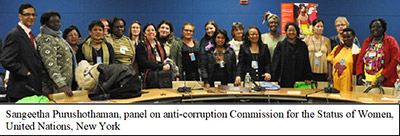
BPF, along with the Huairou Commission, was invited by the United Nations Development Programme (UNDP) to design the first-of-its-kind online course for UNDP staff, on the ways in which they can engender their anti-corruption and development programmes, with the aim to familiarise staff with grassroots women’s articulations of corruption, many of which exceed or deviate from mainstream conceptions of the term.
The course provides a clear understanding of basic concepts surrounding gender and anti- corruption, the impact of corruption on grassroots women, and the strategies developed by women’s groups to fight corruption, as well as concrete case-studies of women’s anti-corruption initiatives from Nepal, Nicaragua, and Uganda. It also provides the legal and policy frameworks that shape the UNDP’s work on both gender and corruption. It introduces staff to pioneering anti-corruption work being conducted by women at the grassroots level, in order to create synergies between grassroots movements and UNDP anti-corruption programming. The goal of the course is to prepare UNDP staff to begin a process of co-creating and designing anti-corruption initiatives with grassroots women’s groups.
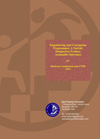
On behalf of the Huairou Commission and UNDP
Corruption is a major impediment to development and the achievement of the Millennium Development Goals. Undertaken in eight nations worldwide using several indicators and translators, this study documents the ways in which grassroots women in the developing world experience public-sector corruption. It voices their concerns and presents their recommendations for country-level anti-corruption initiatives. The study was launched by the UNDP at the International Anti-Corruption Conference organised by Transparency International in Brasilia in November, 2012.
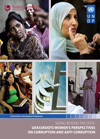
On behalf of the Huairou Commission and UNDP
The Huairou Commission and UNDP's Global Thematic Programme on Anti-Corruption for Development Effectiveness (PACDE) teamed up to undertake a study in 11 communities across eight countries spanning three continents. The study illuminates grassroots women's perceptions and lived experiences, bringing to the forefront grassroots women's voices to contribute to anti-corruption programming.
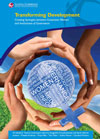
On behalf of the Huairou Commission
A compendium of best practices that illustrate how grassroots organisations have evolved strategies from global trends to include women in governance.
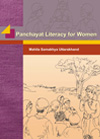
In collaboration with Mahila Samakhya, Uttarakhand
A toolkit to systematically build the governance capacities of women in the Panchayats.
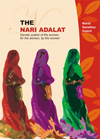
For Mahila Samakhya, Gujarat
Context, perspective and non-negotiable criteria for the setting up and functioning of the Nari Adalat or women's courts whose objective is to provide gender justice to poor women.
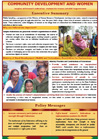
For the Ministry of Rural Development
Sanghas and federations, rights-based collectives of rural women's organisations, emerged as a result of the Mahila Samakhya programme of the MHRD. This policy brief, culled for the Ministry of Rural Development from a year-long study of the best practices of these organisations, recommends ways in which community participation can be increased by linking with federations as implementation partners.
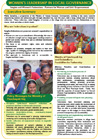
For the Ministry of Panchayati Raj
The primary agenda of all Ministry of Panchayati Raj (MoPR) programmes is to ensure collective empowerment through a bottom-up approach. This brief, based on a year-long study of grassroots collectives of the Mahila Samakhya programme, recommends promoting community-based governance mechanisms, recognising these organisations as grassroots partners for planning and involving them to engender governance.
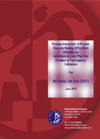
For Sir Dorabji Tata Trust (SDTT)
The main objective of this study was to create a set of process and impact indicators to measure the progress of District Planning Committees (DPCs) at all levels through a collaborative, participatory process. This report provides the updated findings of these indicators tested across three sites, with the process and results described at length.
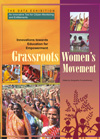
For the Ministry of Human Resource Development and DFID
The Data Exhibition was a tool created by Mahila Samakhya, Assam, to enhance accountability and transparency in Panchayati Raj Institutions. The initiative involved women's groups holding public exhibitions wherein real entitlement data was juxtaposed against official data of entitlements obtained by filing the RTI. This exposed the corruption in the system and helped people demand their entitlements. The study has been so well received that the National Women's Empowerment Mission is now piloting a programme to institutionalise this innovation nationally.
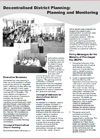
For the Ministry of Panchayati Raj
Policy inputs for the Ministry of Panchayati Raj (MoPR) to recognise the autonomy and build the capacities of the local planning units, recognise social audit processes as intrinsic to ensuring community engagement in monitoring and have planning indicators that reflect process, outputs and outcomes.
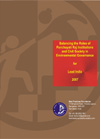
For Lead India
A critical appraisal of the role of panchayats in environmental governances and ways to empower them without compromising the participation of the community.
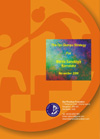
For Mahila Samakhya, Karnataka
In the Oni Gumpu strategy introduced by Mahila Samakhya, Karnataka, neighbourhood groups constitute a platform for information dissemination, community programme monitoring and addressing important issues. This paper builds a case for replicating the strategy through an examination of its objectives, process, capacity-building needs, cost effectiveness, impact and achievements.
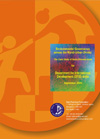
For Department for International Development (DFID), India
The PUI, with its combination of urban and rural features, requires an integrated approach to planning and implementation. This article contributes towards the understanding of the formal and informal institutional mechanisms governing the use of natural resources and the livelihood options of the poor in the peri-urban context. The analysis is based on the findings of action research projects conducted between 2000-2005.
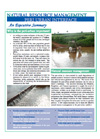
For Department for International Development, UK
Based on close to a decade of research by a multi-disciplinary team, this policy brief contains guidelines for the sustainable development of the peri-urban interface (PUI). Some of these include the need for mechanisms for rural and urban collaboration, and empowering the DPC to create responsible bodies to address PUI issues.

For CARE, New Delhi
A long-term strategy to facilitate the entry of CARE into the area of local governance. The strategy is designed to match CARE's goals and objectives with needs and opportunities in the area of rural local self-governance.
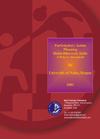
For Environment and Urbanisation journal
This paper describes the process of participatory planning in five peri-urban villages in the Hubli-Dharwad region to enhance the livelihoods of the poor and manage the natural resource base. The paper describes the characteristics of the villages involved and their specific peri-urban aspects; the tools used; the main issues that emerged from the process and their relevance to different groups (women, landowners, landless and lower castes). It also summarises the main lessons learnt.
On behalf of the Huairou Commission and UNDP
A summary of the capacity building and support needs of grassroots networks attempting to build alliances with other institutions working to combat poverty. It outlines the role of government and donors in legitimising the influence of these networks so that communities can have a say in determining their own destinies.
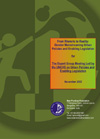
For the Expert Group Meeting led by the UNCHS on Urban Policies and Enabling Legislation.
A gender perspective of urban issues and women's initiatives that have emerged in response to them; a framework with policy implications for engendered governance and gender sensitive urban policies.

For Department for International Development (DFID), India
This pioneering book on the peri-urban interface (PUI) in India is unique in highlighting issues related to natural resources, livelihoods and policy. This study takes a multi-disciplinary approach to a large range of issues such as cropping, livelihoods, markets, sewage, livestock, land, and water. The research attempts to fill critical gaps in knowledge in these areas.
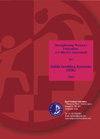
For Mahila Samakhya, Karnataka (MSK)
An assessment of the growth of women's federations through their history, activities and feedback of their performance from women. This study was based on 32 federations formed by Mahila Samakhya, Karnataka, and assessed the need for capacity building to strengthen these federations.
For Environment and Urbanisation journal
A detailed process to develop participatory action plans for natural resource management and livelihoods in rural areas. The document presents approaches, conflict resolution methods, stakeholder concerns and lessons learned. The key finding is that for marginalised populations, such as women and the landless, mobilisation must precede planning.
On behalf of the Huairou Commission, commissioned by the International Union of Local Authorities
Sensitising local government to the need for mechanisms that allow women's effective participation in local decision-making is vital to good governance. This paper presents the perspectives of both grassroots women and local government. It highlights best practices of successful partnerships between women and local government and from these examples, outlines the principles on which such a partnership can be based, locally and globally. It simultaneously outlines gaps in areas of work and the basis for future partnerships from a grassroots women's perspective.
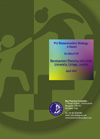
On behalf of the Development Planning Unit of the University College, London
As assessment of the effectiveness of the dissemination strategy for environmental planning and management, this document considers criteria such as the utility, validity and legibility of the publicity material. The results indicate that rural and/ or illiterate audiences are best reached through visual media tools such as videos and street theatre.